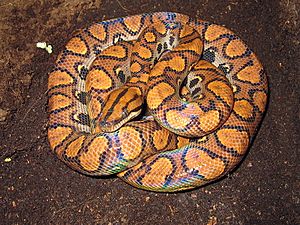Rainbow boa facts for kids
Quick facts for kids Rainbow boa |
|
|---|---|
 |
|
| Conservation status | |
| Scientific classification |
|
| Kingdom: | Animalia |
| Phylum: | Chordata |
| Class: | Reptilia |
| Order: | Squamata |
| Suborder: | Serpentes |
| Family: | Boidae |
| Genus: | Epicrates |
| Species: |
E. cenchria
|
| Binomial name | |
| Epicrates cenchria (Linnaeus, 1758)
|
|
| Script error: The function "autoWithCaption" does not exist. | |
| Synonyms | |
|
Synonyms List
|
|
Script error: No such module "Check for conflicting parameters".
The rainbow boa (Epicrates cenchria) is a type of boa species that lives only in Central and South America. This snake is known for its amazing shiny, rainbow-like colors. These colors appear because of how light bounces off its scales. It's like a natural hologram! The rainbow boa can climb trees and also spends time on the ground. There are five different types, or subspecies, of rainbow boas.
Contents
Where Rainbow Boas Live and Their Homes
The rainbow boa can be found in lower Central America, in countries like Costa Rica and Panama. They also live further south in South America. You can find them east of the Andes mountains. Their range reaches northern Argentina, including many provinces there.
These snakes usually live in wet forests and rainforests. But they can also be found in open grassy areas called savannas.
How Rainbow Boas Behave
Rainbow boas are nocturnal, which means they are most active at night. They are often busiest in the middle of the night.
These snakes spend time both on the ground and in trees. They are also known to swim in water. They are considered very good swimmers.
Rainbow Boa Reproduction and Life Cycle
Male and female rainbow boas are ready to mate at different ages. Female boas should be between 2.5 and 4.5 years old before they breed. Males can start breeding when they are at least 2.5 years old. It's important for females to be the right size. This helps prevent problems during and after giving birth. One male can mate with several females.
Eating Habits During Breeding Season
During the mating season, male rainbow boas often stop eating. Females tend to eat less during this time. To help females have healthy babies, they should be fed smaller rats or mice. This leaves enough space for the babies to grow properly inside them.
It is normal for both male and female snakes to go without food during the mating season.
Rainbow Boas as Pets
The most common type of rainbow boa kept as a pet is the Brazilian rainbow boa. Its scientific name is E. c. cenchria. In the 1980s and early 1990s, many of these snakes were brought from Suriname. Today, fewer are taken from the wild. Most rainbow boas sold as pets are now born and raised in captivity.
With good care, a Brazilian rainbow boa can live for up to 30 years as a pet.
Types of Rainbow Boas (Subspecies)
There are several different types, or subspecies, of rainbow boas. Each one has its own scientific name and sometimes a common name.
| Subspecies | Taxon author | Common name | Geographic range |
|---|---|---|---|
| Epicrates cenchria barbouri | Stull, 1938 | Marajo Island rainbow boa | |
| Epicrates cenchria cenchria | (Linnaeus, 1758) | Brazilian rainbow boa | the Amazon Basin and in coastal Guiana, French Guiana, Suriname and southern Venezuela |
| Epicrates cenchria gaigeae | Stull, 1938 | Peruvian rainbow boa | |
| Epicrates cenchria hygrophilus | Amaral, 1935 | Espirito Santo rainbow boa | |
| Epicrates cenchria polylepis | Amaral, 1935 | Central Highlands rainbow boa |
What's in a Name?
The names of some subspecies honor famous scientists. For example, barbouri is named after an American herpetologist named Thomas Barbour. Gaigeae is named after another American herpetologist, Helen Beulah Thompson Gaige. Herpetologists are scientists who study reptiles and amphibians.
Amazing Rainbow Boa Appearance
Rainbow boas are famous for their stunning looks. Their appearance fascinates both reptile fans and nature lovers. Their unique features make them stand out from other snake species.
Vibrant Colors and Iridescence
One of the most amazing things about rainbow boas is their bright, shimmering colors. They have many different shades, including deep reds, oranges, yellows, greens, blues, and even purples. The way their scales shimmer is called iridescence. It makes them look like they're glowing when light hits them. These bright colors make rainbow boas truly beautiful to look at.
Unique Patterns on Their Scales
Besides their vibrant colors, rainbow boas also have special patterns on their scales. These patterns can be different for each type of rainbow boa. They can even vary from one snake to another. Some rainbow boas have saddle-shaped marks along their bodies. Others might have blotches or speckles. These patterns add to their beauty and make each snake unique.
Smooth and Glossy Scales
Rainbow boas have scales that are smooth and shiny. These scales make the snake look even better. But they also have important jobs! The overlapping scales protect the snake and help it keep water inside its body. They also help the snake move easily across different surfaces. The sleekness of their scales adds to the overall beauty of rainbow boas.
The mix of bright colors, special patterns, and smooth scales makes rainbow boas truly remarkable. Their beautiful look is often why people admire them. They are popular exotic pets and a fascinating part of the natural world.
Images for kids
See also
 In Spanish: Boa arco iris para niños
In Spanish: Boa arco iris para niños
 | James Van Der Zee |
 | Alma Thomas |
 | Ellis Wilson |
 | Margaret Taylor-Burroughs |



